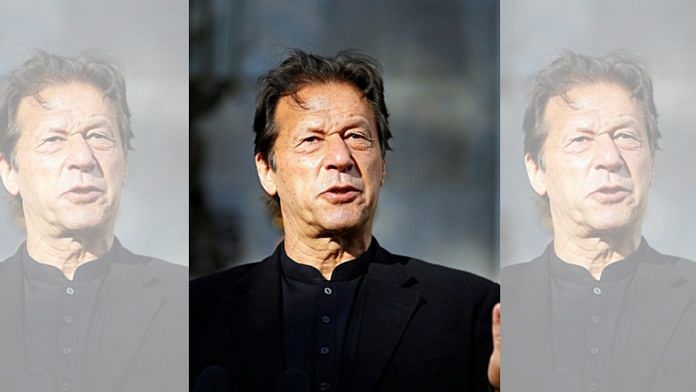New Delhi: Former Pakistan prime minister Imran Khan was arrested by the Lahore police Saturday, hours after an Islamabad trial court found him guilty in the Toshakhana case, and sentenced him to three years in prison.
A day ago, the apex court of the country had denied the cricketer-turned-politician’s plea against the trial proceedings, thus offering him no relief in the case, which pertained to Khan allegedly purchasing foreign gifts from the Toshakhana at a lower price and then selling them in the open market for a profit.
Khan, 70, who was disqualified as a member of Pakistan’s National Assembly last October, plans to file a petition against the apex court’s decision, his lawyer told Reuters.
The Toshakhana case was filed last year by the coalition government led by Pakistan Muslim League-Nawaz (PML-N) which alleged that he did not disclose information on gifts given to the Toshakhana as also the proceeds from the “illegal” sale of some of the gifts.
According to legal expert Imaan Zainab Mazari-Hazir, this won’t only have ripples on Khan’s case but also on Pakistan’s general elections scheduled to be held early November.
“Irrespective of whether this judgment is appealed, there will be further delays and complications in the case and a long-drawn out battle in the courts. More importantly, the elections are unlikely to go through peacefully,” she told ThePrint.
Poll bells are already ringing in Pakistan after Prime Minister Shehbaz Sharif said Friday that he would recommend the dissolution of the National Assembly on 9 August, setting the stage for fresh elections in the economic crisis-hit country.
Khan is not the first Pakistani leader to face a Toshakhana-related corruption case. Former president Asif Ali Zardari and former prime ministers Nawaz Sharif and Yusuf Raza Gilani have also been accused of relaxing rules to obtain luxury cars from the treasury house.
This was revealed in a 446-page document released by the Pakistani government in March. “Pervez Musharraf and Shaukat Aziz retained hundreds of foreign gifts without paying a penny,” the report had also mentioned.
Also read: India should consider restoring economic ties with Pakistan if they come forward, says House panel
The case
The criminal case revolves around the Toshakhana — the country’s “treasure house” that comprises gifts received as honour. Established in 1974, it falls under the supervision of the Pakistan Cabinet.
Many countries have Toshakhanas including India where it is managed by the Ministry of External Affairs.
Gifts are usually considered State property and leaders are viewed merely as recipients on behalf of the country.
In this particular case, Khan was accused of selling four gifts he received from Saudi crown prince Mohammed bin Salman, in November 2018 — an antique watch, a gold pen, a ring, and a set of cufflinks that Khan allegedly sold for approximately $2 million.
Khan was also accused of buying precious gifts at low rates from the Toshakhana, selling them for a profit, and concealing proceeds made from the sale.
In an interview with Geo News in March 2019, a Dubai-based businessman claimed he was approached by one of Khan’s aides, Mirza Shahzad Akbar, about buying the antique watch. Akbar then reached out to Farah Gogi, who has links to Khan’s wife.
According to Pakistani law, precious gifts must be deposited in Toshakhana and officials are required to reveal any gifts they receive. However, they also have the option to keep these gifts provided they pay a certain percentage of the price.
When Khan entered into power in 2018, his government introduced a law to procure gifts from the Toshakhana at 50 percent of its original cost instead of the earlier 20 percent. Despite this, he was found to have purchased these gifts at 20 percent itself, before selling them in the open market.
(Edited by Smriti Sinha)
Also read: India to attend Ukraine peace talks in Jeddah, Russia not invited. What to expect from Saudi summit



